The Cast of Dallas Comedy House’s That ’90s Show (Yes, All of Them) Talks Their Favorite ’90s Memories And What It Takes to Bring a Sketch Show to the Stage.
Welcome to Humor Us, our column in which Dallas comedian Alex Gaskin interviews other area comedians about the ol’ funny business in order to help introduce DFW at large to the burgeoning comedy scene blooming right under its nose.
If we’re discussing it under purely logistical terms, life as a stand-up is easy. You don’t have to worry about equipment, a particular stage setup, or costumes. Your technical considerations are minimal.
On the other hand, the sketch shows put on by Dallas Comedy House are… well, not simple. They demand a remarkable degree of effort through the combined creative efforts of a dedicated cast.
This weekend, DCH is set to debut That ’90s Show, a sketch program based around… well, take a guess. Director Jonda Robinson and assistant director Cesar Villa have led the cast of Sarah Adams, David Allison, Madison Frihart, Cody Hofmockel, Colin Jamerson and Gabriel Vasquez from the show’s conception through the writing and development, and all the way to the performances, which officially begin this Friday and will run through Saturday, March 18.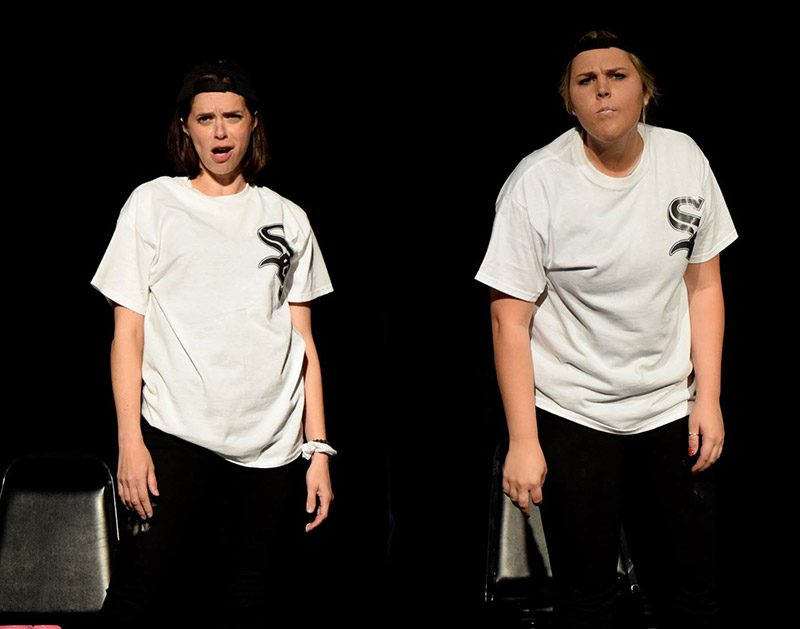 So what does it take to make something like That ’90s Show happen?
So what does it take to make something like That ’90s Show happen?
For starters, it requires an impressive degree of patience, as this crew’s been working on their show since last November. To learn more about that process, I spoke to the directors, and all of the cast — yes, all of them — to get a better idea of what it took to produce the show, whether it was a challenge to make the 1990s experience feel universal and what separates the sketch shows from other forms of comedy.
OK, first things first, I wanted to get a sense of what it takes to bring That ’90s Show to the stage. how long has this been in development?
Gabriel: Twenty years, I think?
[All laughing.]
Jonda: We did auditions at the end of November, and our first meeting was the last weekend of November.
So there’s the writing component, of course. Do you put it together after the auditions? How did it come together?
David: For this particular show, we didn’t have an idea for the show in mind when casting was done. We had a couple of meetings, pitched some show ideas and we settled on That ’90s Show when we had so many more pitches for that than we had for some of our other ideas. It just seemed easier, and more inspiring to write for.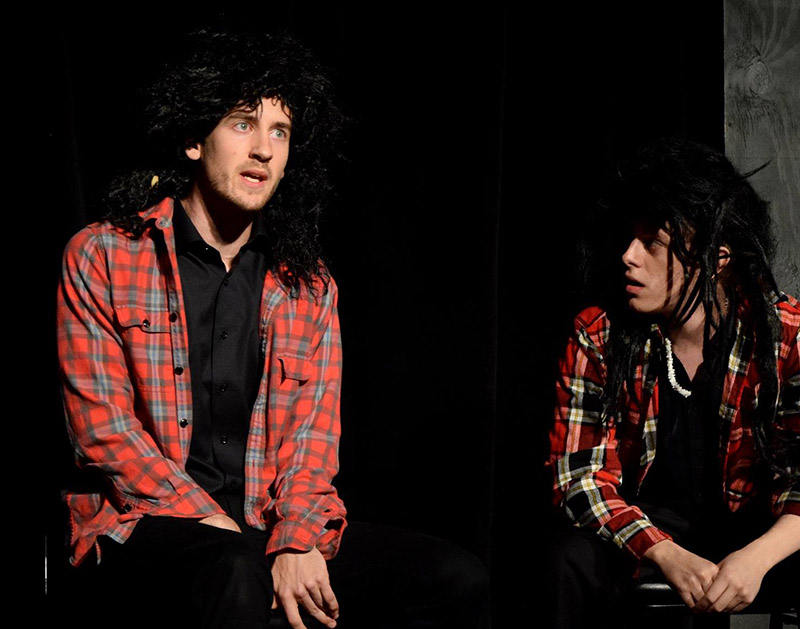 You have a director [Jonda Robinson] and assistant director [Cesar Villa] for the project. Can the two of you talk to me about your role in making the show happen?
You have a director [Jonda Robinson] and assistant director [Cesar Villa] for the project. Can the two of you talk to me about your role in making the show happen?
Jonda: Our role has been to keep things on track, and give out directives — like, “Hey, we need to do these kinds of pitches.” We also kind of look for what the show’s lacking, what we need to add to it. I think while they’re looking at the micro picture of the sketches they’re writing, we’re looking at the big picture of how we can put this all together.
Cesar: Yeah, just an outside view, because it’s harder when you’re on the inside to figure out what’s still funny. Are we pushing something just because we’re in love with this idea, or do we need to expand it for find a different way to get there? Or sometimes it’s like, “Alright, that’s not working anymore, let’s try a new idea.”
Can you talk about the writing process? How long did that take?
Sarah: Up until yesterday?
Jonda: As long as we’ve been together.
Cesar: We actually had them write a lot. There was a lot of writing. We didn’t spend as much time as I’ve seen other shows, as far as falling in love with something and just working on that. It was a lot of bringing a lot of stuff, having a bulk, a big bowl of ideas to pull from, and we were able to pull the best from that.
Cody: This was the most content I’ve ever seen for a show — probably 40 sketches.
Sarah: Can you make sure when you write that to say that he’s [Cody’s] wearing aviator sunglasses and a Chicago Bulls jacket?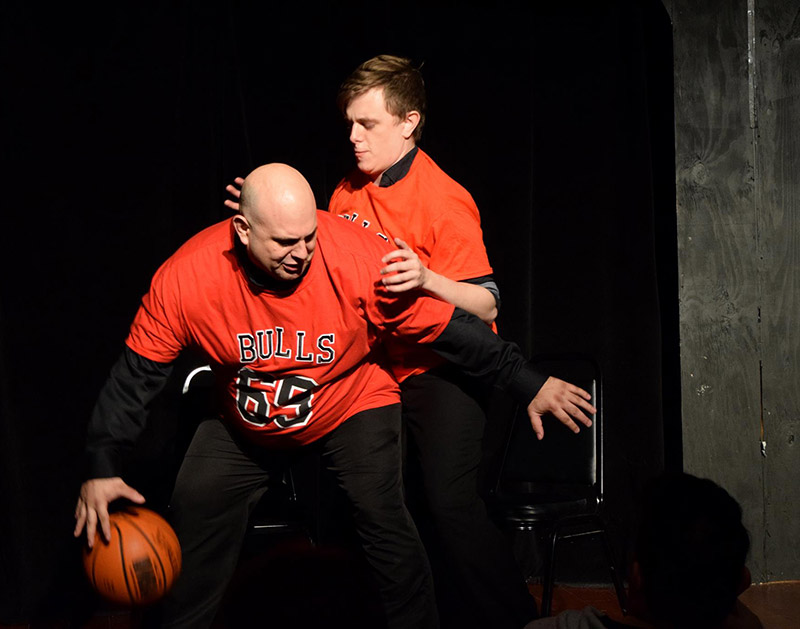 I did want to address that. More than just the writing and acting, you’re sourcing props, having to take those extra steps. Is there a particular aspect of developing and putting on a sketch show that stands out to you, that audiences just aren’t privy to?
I did want to address that. More than just the writing and acting, you’re sourcing props, having to take those extra steps. Is there a particular aspect of developing and putting on a sketch show that stands out to you, that audiences just aren’t privy to?
David: One thing that sticks out to me is that a lot of the theater’s programming is improvised, and one thing that is different about this show is we have to remember lines — and that’s just a completely different aspect of doing a sketch show as compared to an improv show. But we still want to have a same sort of energy that an improvised show would have, where it feels fresh to us and feels fun to us. As enjoyable as it would [feel] the first time we improvised a sketch, that’s hopefully how it feels within a sketch performance. It’s a tough thing to find, but I think we’ve done a good job of that with the show. It still feels super-fun, and we’ve been doing it for two and a half months. [Laughs.]
Sarah: I was trying to think, y’know, what is it that the audience might not see? It all seems so obvious to us since we’re so much in the process. But when I was telling my mother what I was doing, she goes, “Oh my goodness, this is so great! Where’d you guys get the scripts from?” And I go, “No, mom, we wrote it.” “What? Then who came up with the idea?” “We did that, too.” She goes, “Oh, you guys did it all?” [Laughs.] Yeah! We pitched ideas, we wrote the content… I know that might seem mundane, but I think it’s important — because we’re so close to it — that people realize, no, this came from our own heads.
Madison: When I started doing sketch stuff, I didn’t realize how much appreciation for tech I have now, because I think that’s something where people don’t realize how much time that takes, to get all that stuff together and to make sure you’re doing it right.
Colin: The timing of starting and ending… there’s a ton of tech in the show. Getting that timed right can make a huge difference to whether something hits or not. I hadn’t even realized until this show how much difference it makes.
Cody: Hail Cesar.
Sarah: Our tech, and our assistant director, Cesar has done a phenomenal job with all our tech stuff. And I was thinking back on all the sketch shows I’ve seen at DCH, when sketch started being a main stage show. I think this might have the most technical elements in the show. Music to graphics to maybe a fog machine…
Jonda: We’ll see…
[All laughing.]
Sarah: We’ll keep you in suspense on that.
Cesar: Another aspect that I think is challenging but really fun is getting a group of people that haven’t worked together, and getting a show off the ground in a month and a half, two months, and starting to write for each other, knowing what each others’ strengths are. Being able to exploit that, or use that to your advantage, getting that group mind going — that’s tough. And I think they’ve done a great job about it.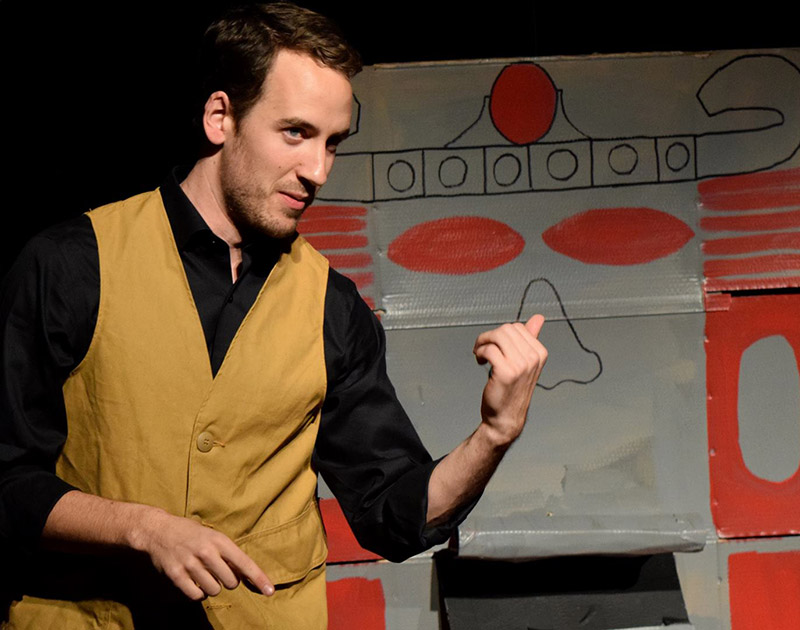 I feel like the name is pretty indicative of what we can expect from That ’90s Show…
I feel like the name is pretty indicative of what we can expect from That ’90s Show…
David: [Laughs.] Let’s hope so.
But can you talk a little more about what we can expect from the show?
Sarah: Like David mentioned already, this was a lot of fun for us to write, because the ’90s were such an influential time for us. We all were alive in the ’90s, I grew up in the ’90s, and there’s a lot of great memories that come from that period. Getting to write to those ideas, and to those memories and to those thoughts, was really fun. I think you’re going to see a lot of nostalgia, but maybe taken in a different direction. I think you’re going to have a lot of fun, and I think there’s going to be a lot of energy in the show.
David: When we were talking about what sort of show we wanted to do, we were discussing, “Maybe we should go political, or maybe we should go with current events?” A common sentiment was that we didn’t want to do that sort of show right now, because there’s so much going on right now that’s just not fun to think about right now. We wanted a show that was truly just a fun escape, where people can just focus on enjoyable things that they remember, as opposed to maybe some struggles they’re dealing with in their current lives. Just give them an hour of fun.
Anybody have a particular favorite ’90s moment or event they’re looking forward to addressing on the show?
Cody: There’s a certain late ’90s game show that really rings of the ’90s to me that we bring out. I think that’s all I want to say about that.
Sarah: We touch on a certain movie that I saw half a dozen times in the theater.
Madison: I think it’s the music, for me, just throughout the show.
Cesar: I hope there are a lot of moments where people think, “Oh, I forgot about that!”
Madison: Because we certainly did that.
Cesar: I think what’s fun is that some of the cast was born in the late ’90s…
Cody: Late?
Jonda: You mean early?
Gabriel: If they were born in the late ’90s, they wouldn’t be allowed in here.
[All laughing.]
Cody: You mean how some people were born in the ’80s and some people were born in the ’90s?
Cesar: Yeah, like some people lived through the ’90s, and some were born in the ’90s. We’d have to explain some stuff to them.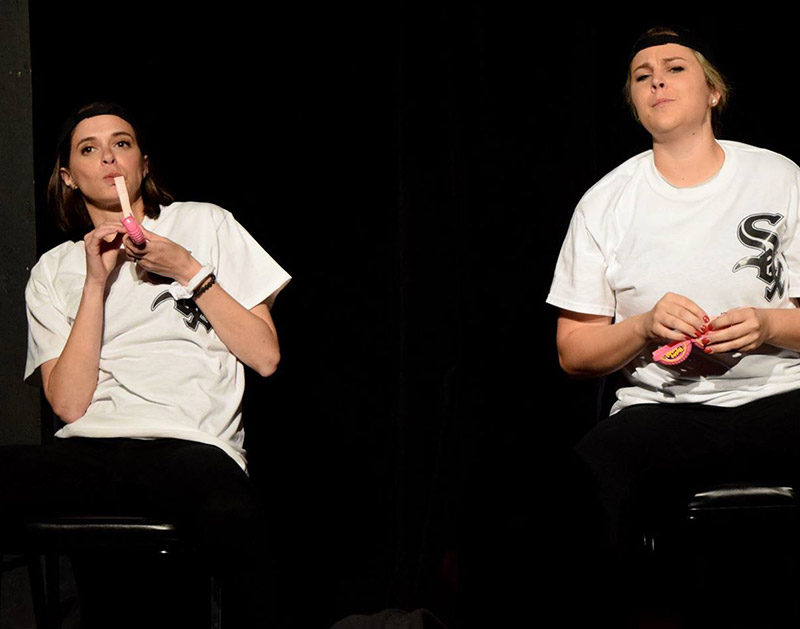 So who needed the most education on the ’90s?
So who needed the most education on the ’90s?
Group: Colin and Cody.
[To Colin and Cody] What was it like for you guys, piecing this all together?
Cody: I was seven at the turn of the millennium, so the ’90s for me were cartoons and younger kid stuff. But I still, like, get the jokes.
[All laughing.]
Colin: I’ve heard of most of these things, but some of them… a lot of them were through other people. I experienced them in different ways.
Cody: My Teletubbies sketch was cut.
Sarah: I was 16 at the turn of ’99.
Cody: You could’ve babysat me!
Sarah: I could’ve. Thanks, Cody.
David: We had to make sure this show was enjoyable for pretty much anybody who saw it, as opposed to people who were obsessed with the ’90s. Because we had a diverse group of ages and experiences, we had to make sure it was funny to all of us, or else it’s not something we could realistically do.
Colin: There were sketches early on that I had no idea what they were about, but I still thought they were really funny.
David: Colin had never heard of OJ Simpson, so weird.
[All laughing.]
Colin: [exaggerated shrug] Who was that guy?
[All laughing.]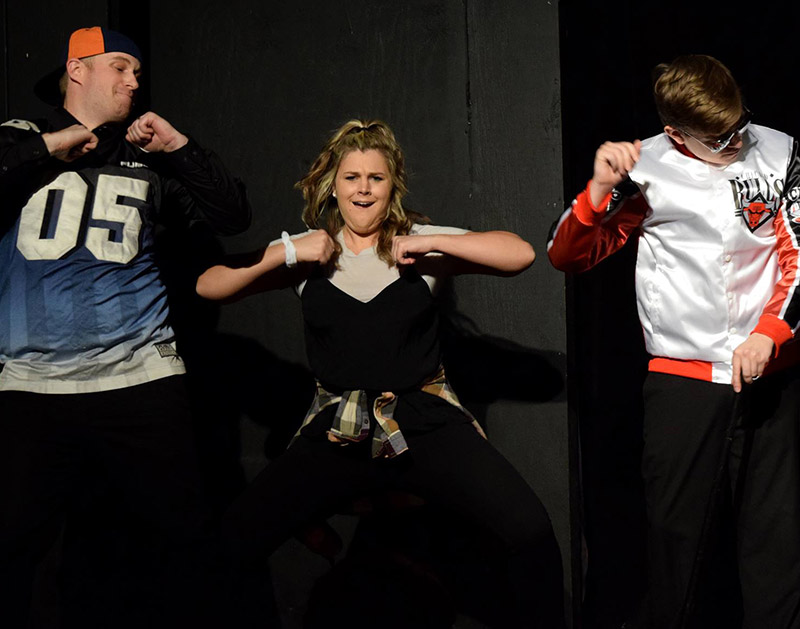 So what, to you guys, makes a live sketch show different from improv or stand-up, or different from a sketch program like SNL that people watch at home?
So what, to you guys, makes a live sketch show different from improv or stand-up, or different from a sketch program like SNL that people watch at home?
Cody: The thing I’ve always liked about sketch is that you don’t have to put it away after you try it in front of an audience. You get time to see what works, make decisions, and really change things, and make small choices based on audience feedback. With an improv show, you can’t ever fix it or do it again. I think the work makes it really gratifying, as far as growing it from beginning to the final product.
Madison: I think as far as watching it, if you were to watch sketch on SNL versus here, I like this experience, personally, better, because you get to sit in a room with a bunch of other people and watch live. I’m one of those people who likes to laugh next to people, I like the live experience better.
David: We also, because of that, get to interact with the audience a lot, which we do quite a bit in the show. Being able to involve them in the show, as opposed to them just watching and not feeling as involved.
Gabriel: It’s also really fun to come together with a group of people, because you spend so much time together that you can’t help but get close to them. Just that pre-show camaraderie by like the fourth or fifth week, it’s really special.
Colin: One thing I like about it is when you do a sketch show multiple times, the shows can go really differently each time. The audience can love something one night, and then something will be different another night. The audience is unique every time, so it gives every time a certain special-ness.
Sarah: So come to all of the shows, if you want to really enjoy That ’90s Show. I think it’s best to come to all 10 showings.
All photos by Jason Hensel. Head here for tickets and more information about That ’90s Show.
